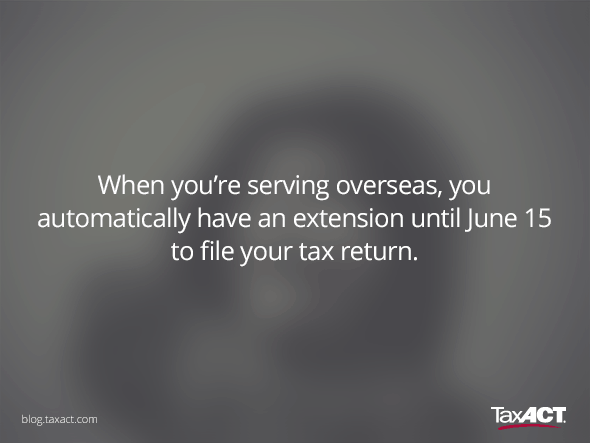
As a member of the armed forces of the United States, you have special situations that may affect your tax return.
For example, you might be able to take special deductions, and not all of your income may be taxable. In addition, you can have different rules of the State of residence.
When using TaxACT as a member of the armed forces, we ensure that you get the tax relief you deserve.
We also give you a break on your income tax expense of the state. Members of the military can get TaxACT state module for only $ 5
Here are some things you should be aware of when doing your taxes :.
Some salaries and military benefits are not taxable
members of the Armed Forces pay taxes on wages basis, including training and active duty payment, remuneration and bonuses, and incentive compensation.
They also pay tax on repayment of student loans for some programs.
you can receive a substantial salary and benefits, however, that you do not have to pay tax. combat pay is not taxable.
Living Allowances (BHA and BAS), which can be an important part of your compensation program, are not taxable.
You also do not have to pay tax on group term life insurance, uniform allowances, moving and travel allowances, job training, child benefits or death benefits.
travel and accommodation costs as a reservist of the Armed Forces, you can also deduct
Each time you travel over 100 miles and spend the night as a member of the Guard national or reservist military, save your receipts.
you can deduct amounts you spent for travel and accommodation related to work, plus 50% of the cost of your meal.
your cost of food and accommodation can not exceed the federal daily rate for accommodation and meals.
you can take this deduction even if you do not itemize your deductions.

you can have more time to file your return
When you are in foreign service, you automatically have an extension of time to file your tax return.
You do not even have to file a form of extension to qualify. This automatic extension for troops abroad gives you until June 15 to file.
If you are serving in a combat zone, you have more time.
The IRS allows you to 180 days from the date of your return from the combat zone, or 180 days from your last day continuous hospitalization for injuries received while serving in a combat zone.
These 180 days are in addition to the number of days you had left the file back when you entered the combat zone.
Even better, you will not accrue interest or penalties during this extension.
you may be able to deduct the military uniforms costs
If you pay for the uniforms that you can not wear when you're off, you can deduct their cost.
you can also deduct amounts you spend to clean and maintain.
Any military surplus moving expenses are deductible
The army usually pay your basic moving expenses when you are serving.
However, you can have moving expenses that you pay. You can deduct expenses you are not reimbursed in motion, even if you do not pass the test of distance or the 39-week work trial.
You and your spouse can keep your old state of residence
you are not obliged to change residence to the State for tax purposes when parked elsewhere as a member the army.
This is true for you and for your spouse.
This means that if you and your spouse live in a state tax on income, but you always have the resident of the state in your old state, the new state can not generally tax the one of your income.
If your tax status of the selected employer, you may produce a non-resident declaration with this condition for a refund.
you can then file a statement with your resident country of origin, if this state has an income tax, to report income.

0 Komentar